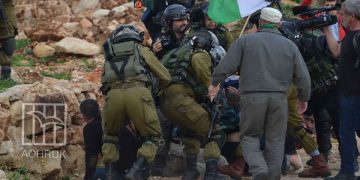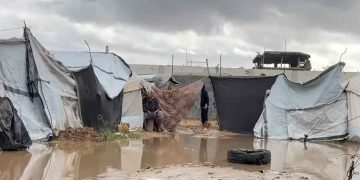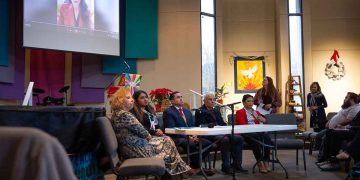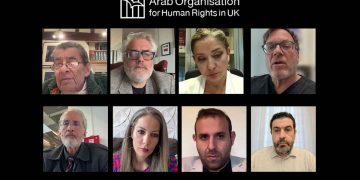Arab Organisation for Human Rights in the UK (AOHR UK) held a poignant webinar yesterday on 14th August 2023 titled “Dark Decade of Impunity: Remembering the Rabaa Massacre and the Ongoing Lack of Accountability in Egypt.” The event marked the grim 10th anniversary of the Rabaa Sit-In raid in Egypt.
Esteemed speakers, including Sarah Leah Whitson of DAWN, Egyptian actor Amr Waked, former UK MP Helen Goodman, human rights activist Ramy Shaath, academics Dr. Abdullah Al-Arian, Dr. Ahmed Ghanem, Dr. Maha Azzam, and director Mohamed Ismail, converged to shed light on the tragic event. The discussion was expertly steered by moderator Melissa Turner, Co-Founder and Co-Editor of BeMagazine.
The Rabaa Sit-In massacre, a harrowing chapter in Egypt’s history, saw hundreds lose their lives when security forces violently dispersed demonstrators in Rabaa Square. Often dubbed as one of the most heinous mass killings in modern history, the events at Rabaa remain etched as a stark reminder of the perils of unchecked power and the absence of accountability.
In her contributions, Sarah Leah Whitson, a prominent human rights advocate, brought forth the chilling details and her quest for justice concerning the Rabaa massacre. Her remarks painted a harrowing picture, underlining that the events were neither spontaneous nor arbitrary. “What happened in Rabaa was a planned, premeditated crime, and we know exactly who the perpetrators were,” Whitson emphasized, adding that the relentless pursuit for accountability will persist.
Whitson, who has personally interviewed survivors, evoked the profound scars of that fateful day. She described it as an episode forever etched in history as a day of mourning and tragedy. The brutality was unimaginable – from the indiscriminate shootings to the setting ablaze of medical centers. The aftermath saw Whitson and her team at the epicenter, as they embarked on a colossal investigative journey. “Some of our staff were at and around Rabaa Square when the massacre unfolded. We interviewed over 200 victims, witnesses, and so forth,” she recounted. Their findings were staggering. Not only did they establish the premeditation of the massacre, but they also unearthed evidence suggesting the government’s anticipation of the scale of casualties.
The depth of their investigation unveiled details about the murder’s planning, right down to the cabinet meetings initiated by the interim Prime Minister of that time. Given the gravity of their discoveries, Whitson and her team ardently championed for an international probe into the events, urging the United Nations to helm this investigation. However, their pursuit of justice faced roadblocks. Whitson revealed that when she attempted to visit Egypt in 2014, she was denied entry. But technology became an ally. “Little did we know that in a few years, everything would become virtual,” she said, highlighting how virtual conferences amplified their reach, allowing global journalists to partake in their mission.
For the global community, the Rabaa massacre signaled a paradigm shift, effectively marking the end of resistance and firmly establishing General Sisi’s reign. Egypt’s geopolitical strategy post-massacre witnessed a surge in arms deals, tightening its nexus with major global powers, from Western nations to Russia. Despite the atrocities, General Sisi’s regime, fortified by allies spanning from Gulf dictatorships to countries like the US, UK, and France, persisted. “The most challenging aspect for me, as an American, is seeing how my government can continue to close its eyes to the massacre,” Whitson lamented.
Concluding her address, Whitson spoke of her association with Democracy for the Arab World Now (DAWN), an organization founded by the late Jamal Khashoggi. This venture draws inspiration from her tenure at Human Rights Watch. As she underscored the pressing need for holding the Egyptian leaders accountable, Whitson also highlighted the importance of introspection by the Egyptians who remained passive spectators. Expressing her profound gratitude and admiration for those who remain entrenched in this battle for justice, she said, “You really are my heroes, and thank you for your faith in principles and in people.”
Human rights activist Ramy Shaath shared his perspective on the aftermath of the Rabaa massacre and the ongoing atrocities faced by Egyptians.
“The bloodshed is still happening,” began Shaath, urging participants to not only remember the events of Rabaa but also to hold those responsible accountable. He underlined, “This is about fighting against the established legitimacy of dictatorship.”
Shaath shared a deeply personal account of the horrifying reality of incarceration in Egypt. “I stayed for 2 1/2 years in prison without a charge,” he revealed, adding that he met thousands of innocents who shared similar traumatic experiences. Some of his fellow inmates were merely bystanders during the Rabaa events, like security guards or vendors, debunking the regime’s claims about the event.
Describing the mass injustices perpetuated by the Sisi regime, Shaath emphasized the fabricated narratives created to vilify the Egyptian people and establish a legacy of brutality. He emotionally recounted, “I’ve left Rabaa in Cairo completely torn… We’ve lived Rabaa every single day of those ten years of continued oppression of Egyptian people.”
Shaath is taking an active stance against these abuses. “I personally have a case against the Egyptian regime in the African Commission regarding what happened to me,” he shared, adding that he’s exploring further legal avenues in Europe and beyond. However, he lamented the apparent double standards in the international arena, where he observed greater action against Russia for its occupation of Ukraine, in contrast to the inertia when addressing allies of the West, like Egypt.
Highlighting the secretive nature of oppressive regimes, Shaath said, “This regime and regimes like it always try to abuse us in the dark.” His message was clear: the hope for the Egyptian people lies in a democratic transformation, aligning with the broader global fight for human rights.
Shaath closed his remarks with a resounding call to action. “My call to our people is to be organized,” he said, pointing out the regime’s vulnerable position. Underscoring the importance of collective memory, he urged everyone to remember the innocent lives lost in Rabaa, declaring, “We will not forget; we will not forgive.”
Ramy Shaath’s contribution to the webinar provided a stark reminder of the continual rights violations in Egypt and emphasized the critical need for international solidarity and intervention. His personal experiences and commitment to justice stand as a testament to the resilience of the Egyptian people and their ongoing struggle for freedom and dignity.
Dr Abdullah Al-Arian, renowned historian and academic, expressed his perspective on the impact of the Rabaa massacre on Egypt’s political and societal trajectory.
For Al-Arian, the Rabaa massacre was not the conclusion of a chapter but the “ignition for a decade-long struggle for justice and rights.” He reflected, “Rabaa was perceived as the end of a movement, yet it sparked a wave that reverberated for years.” The tragedy, which many believed would mark the end of turmoil, instead set the stage for a prolonged period of challenges, reshaping Egypt’s future.
Addressing the intent behind the massacre, Al-Arian noted that it was designed to convey a powerful message against popular uprisings. He emphasized the deliberate message Rabaa sent: uprisings would not be tolerated. This event altered the course of Egypt’s future, setting the tone for how political expression would be perceived and treated.
Expressing concern for the younger generation, Al-Arian commented on the lasting impact of Rabaa, stating, “We are now looking at a generation of Egyptian youth who have been taught that standing up, mobilizing, and speaking out only leads to disaster.” This sentiment underscores the chilling effect the event had on political activism and free expression.
Dr Al-Arian further elaborated on the broader narrative formed not only in Egypt but across the Arab region. The overarching sentiment, he stated, is the belief that the Arab uprisings were a “colossal failure.” The result is a generation seeking survival through immigration or reluctantly working within oppressive systems.
Highlighting the regime’s neglect, Al-Arian pointed out that “Egypt in the last decades ranks dead last in education,” indicating a systematic effort to undermine the education sector.
The Rabaa massacre wasn’t solely an assault on a particular group or political party; it sought to discredit the very idea of mobilization. Al-Arian reminded attendees that the environment allowing such an atrocity to occur was partly the doing of Egyptians themselves, whether by direct action or passive support.
He touched upon the fate of many opposition figures, noting that many either ended up in prison or were forced into exile. The dehumanizing narrative had been in place long before the massacre, contributing to society’s complacency and lack of outrage.
Regarding the international perspective, Dr. Al-Arian recollected the debates surrounding the event, including disputes about whether it was even recognized as a coup. The event’s global implications were evident when he mentioned John Kerry’s testimony, where he lauded the U.S.’s financial assistance to Egypt as one of the best investments in the region.
In his closing remarks, Dr. Al-Arian called for continued efforts to seek justice for the victims of Rabaa and their families, urging the audience to learn from the past and strive for a better future.
In a candid and powerful address, Prominent Egyptian actor Amr Waked not only spoke about the cinematic world but shed light on the broader socio-political issues plaguing Egypt.
Waked began his address by paying homage to the countless innocent lives lost during the Rabaa massacre, describing it as a “televised crime against humanity”. He didn’t mince his words when he termed the current regime in Egypt as “terroristic”, critiquing the international community’s seeming hypocrisy in supporting it.
He drew a chilling comparison, noting, “I think the Western concern about terrorism in Egypt is highly hypocritical. They fear the terror of ISIS, but they embrace and support the terror of Sisi.” Going a step further, Waked emphasized that he saw no discernible difference between the governance styles of ISIS and the Sisi regime.
He also touched upon the absurdity of certain claims, like that surrounding the tragic killing of Asma Baltagi, a 17-year-old girl, during the Rabaa massacre. The young girl’s only ‘crime’ was being the daughter of a Muslim Brotherhood politician.
Switching gears, Waked delved into the state of the cinematic world in Egypt. Lamenting the decline in the number of cinemas and the increasing governmental control, he said, “If you want to make a film, you have to get the permission of an army officer… There’s no cinema really, there’s only propaganda to promote the regime.”
He recognized the changing tide in media consumption, with many now turning to online platforms, skeptical of the propaganda-filled television broadcasts. Despite the intense atmosphere of fear and control, Waked believes that Egyptians are not subdued. He feels that the real challenge lies in navigating the multifaceted threats posed by the regime.
Waked’s vision for Egypt’s future entails a roundtable discussion involving representatives from all political and social spectrums, where they could collectively “decide the rules of the game”. Central to these rules would be the unequivocal demand for accountability in the face of any bloodshed.
In conclusion, Amr Waked’s discourse was not just an analysis of Egypt’s troubled past, but a call for harmony, unity, and understanding. His final words resonated with hope, urging Egyptians to “embrace your differences and live in harmony”.
Helen Goodman, the former UK parliament member, shared her poignant insights on the event’s aftermath and the role of the international community.
Recalling her own memories, Goodman said, “I was in Parliament when the Rabaa massacre happened. Rabaa marked the beginning of a decade of repression.” She called on the global community to introspect, questioning its hesitancy in defending Egyptian human rights. Goodman emphasized that raising awareness about the Rabaa massacre is crucial, particularly given its significance compared to other globally recognized events.
Leveraging her experience in policy and strategy, Goodman described the Rabaa massacre as emblematic from an influencing strategy perspective. She asserted that the quest for justice for those affected by the tragedy is essentially a legal endeavor. This narrative provides a framework for international legal mechanisms to play a more pronounced role in seeking accountability.
With a focus on European politicians, Goodman voiced optimism about their potential role in the cause. “Politicians in Britain, France, and Spain will likely be more interested in what they can do to stop human rights abuses now,” she stated. The strategy she proposed hinged on identifying and rallying parliamentarians passionate about human rights to champion the matter in their respective legislative houses.
One recurring theme in Goodman’s remarks was the power of publicity. She observed, “Repressive regimes hate publicity for what’s going on. They can’t abide it.” By shedding light on ongoing injustices, the international community can exploit the “Achilles’ heel” of such regimes—the spotlight of global attention.
Goodman’s strategy underscores the importance of consistent and concerted efforts, urging individuals and groups to “use a routine” to make stakeholders understand the broader implications of the issue.
She passionately appealed to those in free societies, urging them to remember the repressed and to continue speaking out on their behalf. “Everybody who has freedom should use it to keep on raising matters for the Egyptian people,” Goodman emphasized.
Drawing a parallel from history, she referenced the monumental changes in 1989 in Eastern Europe, highlighting the possibility of positive transformations even in bleak circumstances. Although uncertain about the timing of such a change for Egypt, Goodman stressed the importance of remaining vigilant and prepared.
In conclusion, Helen Goodman’s contributions to the webinar served as a clarion call for a united international effort to spotlight human rights abuses in Egypt and work towards meaningful change. Her remarks underscored the role of international bodies, the media, and individual advocates in ensuring that the victims of the Rabaa massacre, and many others like them, are not forgotten.
Dr Ahmed Ghanem, the renowned political analyst, offered a profound analysis of Egypt’s ten-year trajectory post-Rabaa massacre during the webinar. His reflections painted a grim picture of the geopolitical landscape, emphasizing the dire consequences of a decade-long lack of accountability.
Ghanem initiated his discourse by reminiscing about the aftermath of the Mubarak regime’s collapse, recalling a meeting with then-US Secretary of State, Hillary Clinton. “She was proud that democracy was the route to go,” Ghanem noted, underscoring Clinton’s belief that fostering democracy in the Middle East was integral to combating terrorism.
However, in a bleak turn, Ghanem painted the current scenario in the Middle East as a “0-sum” equation, where young individuals striving for freedom face dire consequences. He lamented the tragic reality where standing up for one’s freedom, as seen in Syria, often results in death. “If you stand for your freedom, you would be killed,” he remarked.
Drawing attention to the international community’s role, especially the US, Ghanem critiqued former President Obama for his reluctance to label the Egyptian military takeover as a coup. This hesitation, Ghanem asserted, effectively gave a carte blanche to the current regime.
Highlighting the dichotomy of powers, Ghanem contrasted the democratic entities striving for progress with the more authoritarian forces that patrol the streets with tanks. The responsibility for Egypt’s current state, he argued, falls partly on the shoulders of American taxpayers and the US government. “Don’t come back and cry after five or ten years and ask why they hate us,” he cautioned.
Amid the grim narrative, Ghanem championed the enduring power of voice and advocacy, evident in the platforms of social media, television, and organized events. Despite the slow pace of progress, Ghanem urged continuity in dialogue. “We’ll keep talking because this is what we can do,” he affirmed.
Praising those who have sacrificed immensely for the democratic cause, Ghanem sees their dedication as the beacon of hope for Egypt’s future. But his message was clear; it was not for Sisi or the existing regime. Instead, he addressed the youth, urging patience, defiance, and unwavering commitment to freedom. “Allah SWT created you to be free… Keep talking and never shut up,” he implored, encapsulating the enduring spirit of resistance.
Dr Maha Azzam, the esteemed Head of the Egyptian Revolutionary Council, delivered an impassioned speech shedding light on the aftermath of the Rabaa massacre, its broader implications, and the overarching theme of dictatorship.
Dr Azzam emphatically stated that the Rabaa massacre was not an isolated incident but an outcome of enduring a long-standing military dictatorship. “It’s a consequence of tolerating dictatorship,” she remarked, stressing the importance of the international community amplifying these sentiments. “We must continue to voice our concerns until justice prevails for the victims.”
While the overarching narrative was a call to the global community, Dr Azzam firmly believes that sustainable change will sprout from Egypt’s roots. “The real change will come from within Egypt,” she declared, emphasizing that the regime’s brutal repression symbolized by Rabaa was merely an intimidation tactic, a stark warning to the masses.
However, her message was unequivocal. The ultimate goal is to eradicate dictatorship in all its manifestations in Egypt. “Democracy and human rights are universal,” Dr Azzam asserted, calling upon the younger generation to critically assess and challenge their governments’ policies.
Positioning the challenges in Egypt within a larger geopolitical context, Dr Azzam highlighted the struggles of the Middle East as an extension of a neocolonial power play. Drawing parallels to increasing global awareness of Palestinian rights, she underscored the imperative need to counteract support for autocratic regimes across the region. “The narrative of Egypt is interwoven with the struggles of the entire region and resonates globally,” she posited.
Pointing fingers at the West, Dr Azzam urged both the United States and Europe to revisit their foreign policies. In her view, supporting democracy isn’t just a strategic move but a moral obligation rooted in their foundational values. She lauded the efforts of human rights organisations, acknowledging their pivotal role in amplifying Egyptian voices.
Dr Azzam’s discourse was a mix of critique, hope, and resilience. She remains optimistic about the inherent power of the Arab people. “People don’t rise just once; they continue their struggle relentlessly,” she said. Challenging the perceived discrimination against Egyptians, she echoed the universal longing for freedom and rights, positioning Egypt as a symbol for the entire region’s liberation.
Concluding her address, Dr Azzam issued a clarion call to her compatriots: “Egyptians, recognize your strength. You are indeed mightier than your oppressors.”
Mohamed Ismail, the Director of Egyptians Abroad for Democracy, shared his reflections on the Rabaa massacre and its implications for Egypt’s future.
For Ismail, Rabaa isn’t just a historic event; it’s emblematic of the daily injustices faced by Egyptians. He referred to the massacre as “a condensed version of the regular violence faced by the nation.”
As a firsthand witness of the events at Rabaa and Nahda Squares, Ismail was emphatic about the peaceful nature of the protests. He testified to the presence of respect and harmony among the attendees, countering narratives that painted the demonstrations as violent or unruly. “Despite potential disagreements with the Muslim Brotherhood’s administration, it’s pivotal to acknowledge what I personally observed,” he stressed.
Ismail’s critique extended to international relations, especially the United States’ stance. He voiced his disillusionment with President Joe Biden, citing perceived hypocrisy in his approach towards Egypt, especially after the role that human rights advocates and the Muslim community played in his election. Ismail commented, “Biden’s overtly friendly gestures towards President Sisi felt like a betrayal, translating to us as an endorsement of the continued oppression of the Egyptian people.”
His remarks highlighted the pitfalls of supporting autocratic regimes for short-term gains, noting that such support might inadvertently breed extremist sentiments in the long run. Ismail asserted, “If you genuinely desire stability in the region, back the choices of the Egyptian people.”
He recounted his experiences in Rabaa and Nahda Squares with pride, viewing his presence as an act of upholding democracy and freedom in the face of an overpowering military coup.
He added, “When I say freedom, I view General Sisi’s regime as an occupation, not merely a corrupted regime.” He expressed hope that the remembrance of Rabaa could pave the way for freeing political prisoners and reinstating freedom in Egypt.
In closing, Ismail addressed the international community, emphasizing the enduring spirit of the Egyptian people in their quest for democracy. He urged nations to stand in solidarity with the Egyptians, ensuring that their choice will be honoured. He also had a message for General Sisi, stating with conviction, “Legally and peacefully, your time will come to an end.”
His parting words encapsulated his vision for Egypt and its global partners: “Let’s forge bridges of love and peace, not bridges stained with blood.”
Messages to Sisi and the World on Egypt’s Democracy
Prompted by the moderator, Melissa Turner, the speakers had shared their views on the possibility of Egyptian democracy and relayed their direct messages to President Sisi, the Egyptian populace, and the global community. Throughout, themes of hope, perseverance, and the importance of international solidarity had emerged prominently. Recurring comparisons to historical precedents, like Eastern Europe’s struggle for democracy and the sacrifices made for freedoms worldwide, painted a vivid picture of a people determined to reclaim their rights. As the closing remarks suggested, this webinar had served as a poignant reminder of the ongoing fight for democracy, freedom, and human rights in Egypt and the broader region.
In his final contribution, Dr. Ahmed Ghanem had emphasized that hope was reflected in the sacrifices many Egyptians had made for their country’s democratic cause. While he was pessimistic about a change from Sisi or the international community, especially the U.S., he believed in the youth’s power to bring about change, urging them to remain patient and vocalize their demands, asserting that their destiny was to be free.
Helen Goodman believed in the persistence of the human spirit. Drawing parallels with Eastern Europe, she had highlighted that international support could be a vital factor for the resurgence of democracy. For Egypt, the solidarity from free nations would help the cause, reminding them that they weren’t forgotten.
Amr Waked, filled with hope, viewed the years post the general revolution as a period of growth and realization for Egyptians. He stressed the importance of unity, embracing differences, and harmonious coexistence. His message to Sisi, quite candidly, had warned him of the impending tide of change. His message to Sisi had been unmistakable: Time was ticking! You better had run, mate!
Ramy Shaath had cast light on the regime’s efforts to oppress in secrecy. He emphasized that shedding light on these transgressions was crucial and believed a democratic transformation was the only genuine solution. His plea to the global citizenry was to understand that fights for rights in different parts of the world were interconnected. His unwavering message to Egyptians was one of organization, strength, and memory.
Dr. Maha Azzam was hopeful, drawing inspiration from the cyclic nature of uprisings. She challenged the international community’s discriminatory outlook towards the Arab world, advocating that Egyptians, like all others, deserved freedom. She conveyed that despite its current power, the tyrannical regime’s fear of the masses signaled its inherent weakness.
Mohammed Ismail had reminded Egyptians of their strength and the long journey they had embarked on. Drawing from historical examples, he stated that achieving democracy took time, and sacrifices made, like those at Rabaa Square, would not be forgotten. He had said, “When I say freedom, I consider General Sisi’s regime as an occupation, it is not a corrupt regime, it’s an occupation.”
His stern message to Sisi’s aides had been a warning of the impending downfall, urging them to distance themselves while they could. He beseeched the international community to support democracy, freedom, and human rights.
Melissa, in her closing remarks, had expressed gratitude to the panellists and the audience. She echoed the sentiments of the speakers, emphasizing the importance of remembering the sacrifices made during the Rabaa massacre and continuing the fight for democracy, freedom, and human rights.




























